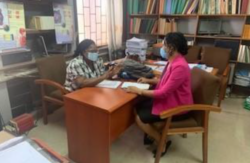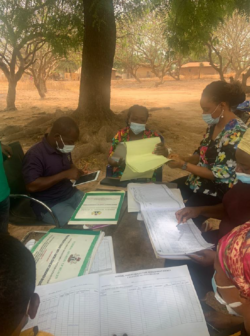USAID’s PMI-S Unleashes the Power of Private Health Facilities to Revolutionize Malaria Data Reporting in Benue State

The grueling battle against malaria in Nigeria can have a victorious end with hope provided by the U.S. President’s Malaria Initiative for States (PMI-S) project. Malaria intervention actors in Benue State shared that private health facilities are hesitant to share their health data with the State Ministry of Health (SMOH). The consistent PMI-S capacity strengthening activities convinced private health facilities of the need and value of reporting malaria service data.
Susan Abege, Benue State Malaria Elimination Program (SMEP) Manager, expressed concern over the low rate of health data reporting by private health facilities to the SMOH. She said, “The state District Health Information Software 2 (DHIS2) does not actually capture the true malaria cascade data because private health facilities do not report malaria data.”
The Ministry of Health in Benue mandates all health facilities to report malaria data for every patient, but private facilities have been reluctant to comply. To address this issue, Banyan Global, under the PMI-S project, enhanced the quality of malaria data reported.

workers in Benue State.
Photo Credit: PMI-S Nigeria
Previously, private health facilities in Benue State were rarely involved in discussions or decision-making processes that concerned them. The PMI-S project changed this narrative by inviting the heads of private medical associations to a data summit in May 2022. This summit provided a platform for dialogue and improved engagement between private health facilities and the Benue SMOH. A major point emphasized during the summit is that all health facilities, regardless of ownership, have a legal obligation to report health and malaria data. This is because data reported by health facilities is crucial in determining facility-specific training, mentoring, and supervision needs. This data is used to determine eligibility to participate in the state’s reduced-cost plans for medicines. Little or no data reporting can make patients seeking care in private facilities miss out on the benefits of innovative and improved treatments that result in data-driven decisions.
Since the data summit in May 2022, the PMI-S and SMEP teams have been conducting mentoring and monitoring visits to selected health facilities. Monthly DVMs with these facilities have been reintroduced across local government areas (LGAs) in Benue State. The purpose of the meetings and facility mentoring visits is to review PMI-S-supported private health facilities’ malaria data registers and make any necessary corrections before the data is updated in Benue State’s DHIS2 database.
It is noteworthy that PMI-S capacity strengthening activities are yielding results. For instance, in Logo LGA of Benue State, private health facilities’ reporting rates were low before the PMI-S interventions. However, after the PMI-S project commenced its work in Logo LGA, the reporting rate among private facilities skyrocketed by 400%, with a total of 16 facilities now reporting.
The presence of the PMI-S project in Benue State, along with Banyan Global’s collaboration with the private sector, has brought private health facilities to the forefront. PMI-S has equipped private health facilities with NHMIS tools and training. It is laudable that consistent advocacy by the Private Sector Health Facilities Associations to the SMEP has ensured the inclusion of the private health sector in health programs.
PMI-S will consistently support private health facilities with capacity strengthening activities on malaria data quality management to enable the informed use of data for decision-making and aid in the realization of malaria-free communities in Benue State.
